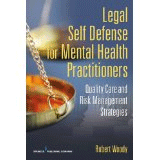“Legal Self-Defense for Mental Health Practitioners: Quality Care and Risk Management Strategies”

“Legal Self-Defense for Mental Health Practitioners: Quality Care and Risk Management Strategies”
By Robert Henley Woody
Springer Publishing Company
New York, N.Y., 2013
Book offers valuable advice in `no-nonsense’ style
Reviewed by James K. Luiselli, Ed.D., ABPP, BCBA
Robert Henley Woody is a psychologist and attorney who has written extensively about mental health and legal matters. In his latest book, he concentrates on “the legal risks of being a mental health practitioner in this day and age.” Among many foci, the book emphasizes strategies for maintaining quality care, managing risk and protecting the rights of practitioners and their clients.
Woody’s central thesis is that the best way to manage risk is for mental health professionals to adopt rigorous practice standards. Concerning treatment, clinicians must embrace current evidence-based procedures and continuously reference the empirical literature. The author goes so far as educating the reader about methods to avoid assessment errors and how to write an individualized treatment plan.
Another aspect of risk management, which Woody covers in several chapters, is “knowing the opposition.” This term means that mental health professionals should understand social and cultural conditions that impact day-to-day practice. As one example, the author contends that today’s “economy relevant to mental health practice now spawns inconsistent, infrequent and often inadequate professional services,” which in consequence, makes a practitioner more vulnerable to malpractice claims. Indeed, one of the best features of the book is learning how legal conflicts are largely predictable and can be overcome through routine preventive efforts.
Another “opposition” force is the recipients of mental health services themselves. On this topic Woody offers a somewhat terse conclusion that “mental health practitioners today face more threatening services clients, some of whom are potentially violent.” He elaborates by defining several contextual variables that are threat-inducing as well as client personality profiles which appear to pose significant risk to practitioners. Most relevant are his many suggestions for reducing and eliminating these risk factors.
There are some very good chapters about structuring and operating successfully in independent practice. For the most part, Woody sees a lack of “business savvy” as contributing to legal complications and practice intrusions. For instance, private practitioners have to market their services but such initiatives must be sensitive to deceptive advertising, client vulnerability and promotional misrepresentation.
Similarly the book deals with issues of setting fees, contractual arrangements with colleagues and having sufficient financial resources to consult with attorneys under unique circumstances.
Most readers, be they mental health trainees or established professionals, will benefit from reading this book. Woody acknowledges that he can sometimes come across as “preachy” and certainly his advice that practitioners need to develop a practice “battle plan” born of a “warrior mindset” could be perceived as off-putting. However, I was not bothered by this tone because it reflects the author’s respectable expertise, scholarship and values – others may disagree.
Having read and reviewed several similar books, I give high marks to “Legal Self-Defense for Mental Health Practitioners’’ because it presents a real-world perspective and no-nonsense analysis. Again, Woody does not mix his words or equivocate on the issues that most impact the considerable risks to contemporary practitioners. As impressive, is that this valuable information is packed into a mere 153 pages, making the book an economical investment of time for the knowledge that is gained.
James K. Luiselli, Ed.D., ABPP, BCBA-D, is senior vice president, applied research, clinical training and peer review at the May Institute in Norwood, Mass.
Learn more about the book: Legal Self Defense for Mental Health Practitioners: Quality Care and Risk Management Strategies
